
Book a Consultation
Thank you!
Your form has been sent successfully.

Your bladder is made up of layers that work together to store and release urine. The inner lining, called the urothelium, is protected by a thin layer underneath it called the lamina propria, with muscle on the outside. These layers are important for your body's everyday function.
Sometimes, the cells in the bladder can begin to grow uncontrollably and form a tumor. This is known as bladder cancer. It's fairly common—more often seen in men, though women can get it too. The sooner it's found, the better the chances are for successful treatment.
Bladder cancer is classified by the type of cells involved and how deeply the cancer grows.
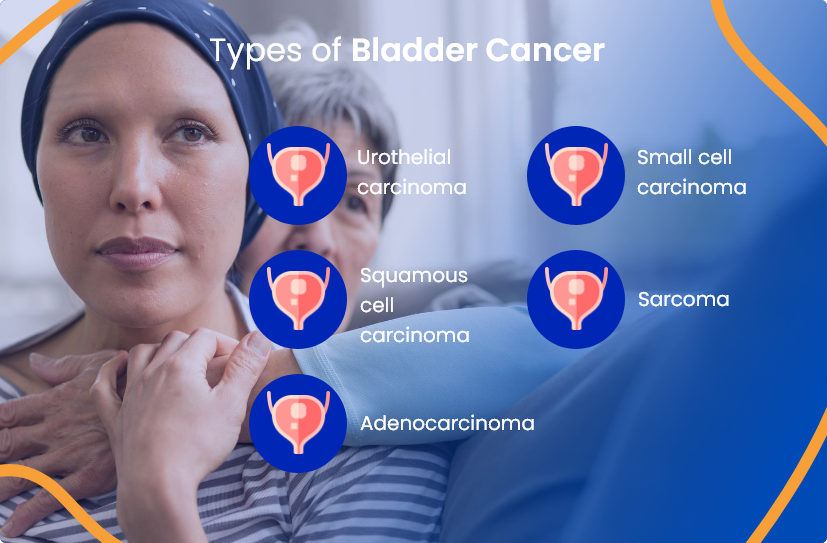
Urothelial carcinoma: The most common type, starting in the bladder’s inner lining.
Squamous cell carcinoma: Less common, often following long-term bladder irritation.
Adenocarcinoma: Rare, similar to certain colon cancers.
Small cell carcinoma: Very rare and aggressive, involving hormone-like nerve cells.
Sarcoma: An uncommon kind that begins in the bladder's muscle cells.
Doctors say tumors are non–muscle-invasive if they stay near the surface and muscle-invasive if they go deeper into the bladder muscle.
Bladder cancer doesn't always cause noticeable symptoms at first. Many symptoms resemble less serious issues like urinary tract infections or kidney stones.
See a doctor right away if you have:
Blood in your urine (visible or microscopic)
Frequent urination, especially at night
Painful or burning urination
Weak urine stream or difficulty emptying your bladder
To diagnose bladder cancer, doctors order tests that check for blood, cancer cells, or signs of tumors. Early diagnosis helps doctors recommend more effective treatments.
These tests typically include:
Urinalysis: Checks urine for blood or signs of infection.
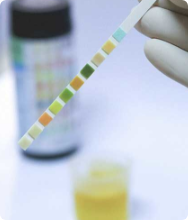
Urine cytology: Looks for cancer cells in urine samples.
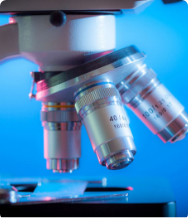
Imaging tests: Uses X-rays, CT scans, or MRIs to see inside the bladder and check for tumors.
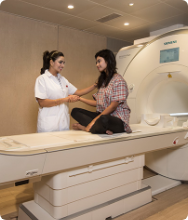
Cystoscopy: Uses a thin tube with a camera to look inside the bladder and check for tumors.
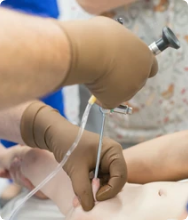

Your treatment plan depends on the size, stage, and type of your tumor, as well as your overall health and medical history. Your doctor will help you choose the best treatment options for your situation.
Surgery: Usually the first step, and may involve removing only the tumor or part of the bladder. Larger or more aggressive tumors might require removing the whole bladder.
Chemotherapy: Medications that attack cancer cells can help shrink a tumor before surgery and reduce the risk of cancer returning afterward.
Radiation therapy: Uses targeted high-energy rays to destroy remaining cancer cells and can sometimes help preserve the bladder.
Immunotherapy: This approach may involve medicines delivered directly into the bladder or intravenous infusions every few weeks. It strengthens your immune system's ability to recognize and attack cancer cells.
At ACTC in Florida, our cancer specialists are committed to providing exceptional care through personalized, evidence-based treatment plans. Each plan is thoughtfully designed to reflect the unique medical needs and circumstances of every patient we serve.
We believe that healing goes beyond the physical, which is why we strive to create a supportive, compassionate environment that promotes both physical and mental well-being throughout the cancer journey.
Our expert providers are here to guide you every step of the way. At ACTC, you can consult with:

Hematology/Oncology

Hematology/Oncology

Radiation Oncology
Our team at ACTC in Florida includes experienced clinical professionals who’ve been supporting cancer patients for over two decades. From your first diagnosis through treatment and beyond, we’re here to guide you every step of the way, all under one roof.
Call 352-345-4565 or book an appointment.

If you are looking for experienced bladder cancer specialists in Florida, then speak to experts at ACTC. Cancer specialists at ACTC are dedicated to providing exceptional patient care by prescribing effective personalized and evidence-based treatment plans for their patients. We strive to create a positive environment for patients and their families throughout their cancer journey. We have some of the best bladder cancer doctors in Florida working on our team.
Schedule a consultation by calling
 352-345-4565
352-345-4565
Blood in the urine and needing to pee often are early signs. Back pain usually comes later.
Bladder cancer can grow slowly or quickly, depending on the type and stage.
Bladder cancer is most commonly diagnosed in people over 55 years old.
Schedule a consultation by calling
 352-345-4565
352-345-4565